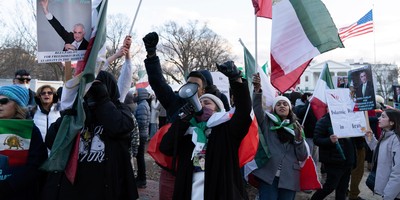WASHINGTON -- Just about everyone in America knows that Sunday, June 15, is Father's Day. The day for dads has been celebrated on the third Sunday of June since 1966, when President Lyndon Johnson decreed it to be so. Those who make and sell power tools and greeting cards have been grateful ever since. Somehow, it just isn't the same for June 14, which is Flag Day and, by no coincidence, the U.S. Army's anniversary.
Father's Day traditionally is memorialized with gifts, cards and calls for dear old dad. Flag Day is all but forgotten. But this year, with the holidays as close as they ever get, there is good reason to celebrate both. As you read this column, tens of thousands of American dads are wearing our country's flag on their shoulders, helmets or flak jackets while serving far from home under some of the most difficult and dangerous conditions imaginable.
Scores of books have been written about the diminished respect accorded to American fathers in our culture. Dads are derided and denigrated in everything from cartoons to commercials. For decades, our entertainment industry and mainstream media have been depicting dads as everything from bumbling buffoons to pathological predators. The dads of "Little House on the Prairie" and "Bonanza" all have passed from the scene. And just like those iconic, heroic dads of yesteryear, waving the flag has gone out of style.
Oh, sure, there was that brief flurry of flag-waving in the aftermath of 9/11. We still can find on the Internet images of soot-covered firemen hanging the Stars and Stripes at the shattered wreckage of the World Trade Center or on the fire-scorched west wall of the Pentagon. And some of us still can recall commuting to work beneath bridges and overpasses on which patriots had draped Old Glory in defiance toward those who brought terror to our shores. But like good fathers, that too has passed. We even have a candidate for president who is acclaimed for refusing to wear an American flag on his lapel.
Recommended
It sometimes seems as though the only place where you can see our flag and a good strong dad together is on -- and in -- a uniform. Rest assured, neither will get the respect or admiration they deserve from Hollywood or the so-called mainstream media.
Despite today's depressing portrayals of paternity and patriotism, there is actually hope for the future, and it comes from those now serving in our armed forces. In the process of conducting hundreds of interviews for my book "American Heroes" -- both here in the United States and overseas -- it became clear that today's military dads have a lot going for them that their civilian counterparts simply don't. Though recent headlines have hyped spiraling divorce, child abuse, suicide and domestic violence rates in our armed forces, the actual statistics for all these "adverse factors" are considerably lower in our military than they are for a similar age group in the civilian population.
When I visit U.S. military bases with our Fox News' "War Stories" documentary unit, I frequently have the opportunity to ask schoolchildren, "What does your dad do?" Though their dads may have been gone for months and 10,000 miles from home, the responses are overwhelmingly affirmative: "My dad drives a tank," "My dad flies a plane," "My dad makes a ship go." At Camp Lejeune, N.C., two weeks ago, a 7-year-old told me, "My dad is a Marine platoon sergeant. He's fighting for our country in Afghanistan."
You don't have to be old enough to remember Art Linkletter's "Kids Say the Darndest Things" to know that unless dad is a fireman or a cop, most young people haven't the foggiest idea what dad does all day at work. While these anecdotes are hardly scientific evidence, they do tend to amplify real differences between military and civilian dads.
Today's military dads are all volunteers. They are brighter, better-educated and in far better physical condition than their civilian peers. Notwithstanding the extraordinary hardship of repeated long separations, the inevitable stress of combat, and the danger and uncertainty attached to their work, they generally express greater job satisfaction than their nonmilitary counterparts. Though wartime deployments shift most of the burden for child rearing onto their mothers, the children of military dads express greater certainty and admiration for what their fathers do than their nonmilitary peers.
Does any of this make a military dad better than a civilian father? Certainly not. But in an age when our media disparages fatherhood in general and defames those who wear uniforms in particular, this would be a good weekend to go ahead and wave the flag and thank God for fathers who are willing to serve.
























Join the conversation as a VIP Member